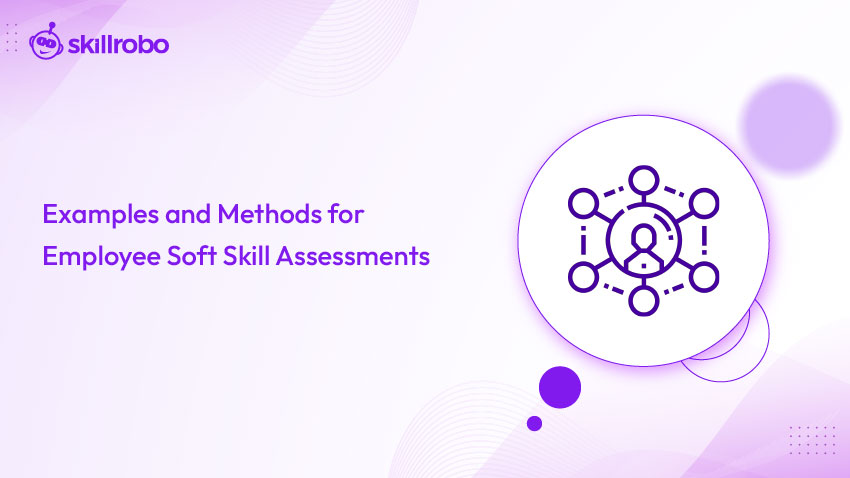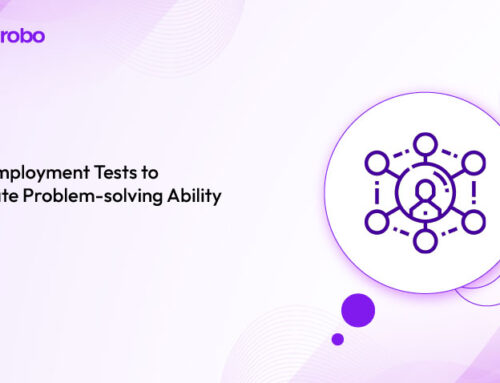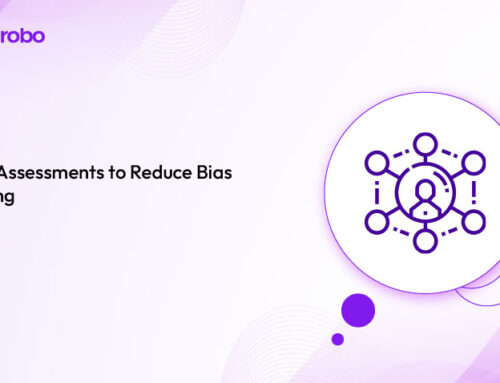
Key Takeaways
- Employee soft skill assessment provides objective insights into communication, teamwork, and adaptability.
- Behavioral assessments, role-playing, and 360-degree feedback are effective ways to evaluate soft skills.
- Common mistakes to avoid include relying only on interviews or using one-time assessments.
- Skillrobo simplifies soft skill evaluation through structured, customizable assessments and real-time feedback tools.
Why Soft Skill Assessment Matters for Building High-Performing Teams
Technical skills might get employees hired, but it’s soft skills that determine whether they — and the business — thrive.
Communication, adaptability, leadership, and emotional intelligence drive collaboration, innovation, and long-term success. That’s why employee soft skill assessment is critical for building high-performing, resilient teams.
Soft skills influence how teams work together, solve problems, and adapt to change. Without them, even technically strong employees can struggle to contribute effectively.
However, assessing soft skills is more challenging than measuring technical ability. It requires structured observation, behavioral assessments, and real-world simulations, not just traditional testing.
Companies that invest in soft skill evaluation see stronger engagement, lower turnover, and better team performance.
This guide covers why soft skill assessments matter, proven methods for evaluating them, and how platforms like Skillrobo simplify the process for modern businesses.
What is Employee Soft Skill Assessment?
Employee soft skill assessment is the structured process of evaluating an individual’s interpersonal abilities, such as communication, teamwork, adaptability, leadership, emotional intelligence, and problem-solving. While technical skills are often easier to measure through tests or certifications, soft skills are harder to quantify because they are reflected in behaviors, reactions, and interactions over time.
Soft skill assessments typically involve a combination of behavioral evaluations, real-world simulations, role-playing exercises, peer feedback, and structured observations. Rather than relying on resumes or interviews alone, organizations use targeted tools to understand how employees collaborate, resolve conflicts, manage change, and engage with colleagues and customers.
Conducting soft skill evaluations helps businesses:
-
Improve team collaboration and productivity by identifying employees who contribute positively to group dynamics.
-
Identify future leaders who demonstrate emotional intelligence, influence, and resilience under pressure.
-
Reduce workplace conflicts by promoting effective communication, empathy, and conflict resolution skills.
-
Enhance customer satisfaction through better service delivery and relationship management.
-
Support employee career development by tailoring training programs that strengthen individual soft skill gaps.
As remote and hybrid work environments become more common, soft skills like communication, adaptability, and self-motivation are more valuable than ever.
Organizations that prioritize soft skill assessment position themselves to build stronger, more cohesive, and agile teams ready to thrive in any work setting.
Why Soft Skill Assessment Matters
Soft skills directly influence how employees collaborate, lead, solve problems, and represent your brand to clients and stakeholders.
Even the most technically skilled employees can struggle without strong interpersonal abilities like emotional intelligence, adaptability, teamwork, and communication.
A candidate who excels in technical tasks but lacks empathy or leadership skills can disrupt team dynamics, hinder project outcomes, and weaken customer relationships.
That’s why investing in structured soft skill assessments is not just beneficial — it’s essential for building sustainable, high-performing organizations.
Evaluating soft skills helps companies:
-
Promote fairly and avoid unfair hiring by basing advancement opportunities on a complete view of both technical and interpersonal strengths, minimizing the risks of unfair hiring.
-
Build stronger, more cohesive teams by identifying individuals who communicate effectively, resolve conflicts constructively, and contribute positively to team culture.
-
Retain high-potential employees who thrive in collaborative environments and are aligned with company values.
-
Create leadership pipelines for future growth by recognizing employees with the soft skills needed to inspire, guide, and manage teams.
-
Adapt faster to industry changes and disruptions by cultivating flexible, resilient teams that can navigate uncertainty and shifting business demands.
In short, assessing soft skills isn’t optional — it’s a strategic necessity for long-term business success, organizational agility, and sustainable growth.
Best Methods for Employee Soft Skill Assessments
Assessing soft skills isn’t as straightforward as evaluating technical abilities.
It requires a blend of structured evaluations, real-world tasks, and behavioral insights to accurately capture interpersonal competencies.
Using multiple methods ensures a more complete and unbiased understanding of an employee’s strengths and development areas.
Here are the most effective methods for evaluating employee soft skills:
1. Behavioral Assessments
Behavioral assessments are designed to uncover how employees respond to real-world challenges.
Rather than focusing on theoretical knowledge, they assess traits like leadership, empathy, resilience, and decision-making.
How to Use:
Use structured behavioral assessments to evaluate how employees have behaved in specific workplace scenarios.
Example:
Ask candidates how they handled a difficult team member, adapted to shifting project goals, or resolved client conflicts in past roles.
Why It Works:
Past behavior often predicts future actions. Behavioral assessments offer reliable insights into actual competencies beyond rehearsed interview answers.
2. Role-Playing Exercises
Role-playing exercises simulate real-world workplace challenges, offering live observation of communication, negotiation, and conflict-resolution skills.
How to Use:
Develop realistic scenarios aligned with day-to-day tasks.
Example:
Simulate a customer complaint or difficult negotiation and observe how the employee communicates and resolves the issue.
Why It Works:
Role-playing is highly effective for assessing communication skills under real-time pressure, revealing empathy, clarity, and emotional intelligence in action.
3. Peer Reviews and 360-Degree Feedback
Soft skills often emerge most clearly in daily interactions.
Peer reviews and 360-degree feedback collect insights from supervisors, peers, and subordinates to form a well-rounded view of an employee’s soft skills.
How to Use:
Use structured feedback surveys that focus on collaboration, communication, adaptability, and leadership.
Example:
Gather feedback on how an employee supports colleagues on projects, adapts to team changes, and handles constructive criticism.
Why It Works:
360-degree feedback reduces bias by gathering insights from multiple viewpoints, a method particularly useful for avoiding favoritism at work.
4. Situational Judgment Tests (SJTs)
Situational Judgment Tests (SJTs) present employees with hypothetical workplace challenges and ask them to select the best response.
How to Use:
Create customized SJTs based on real workplace dilemmas relevant to the role.
Example:
An employee is presented with a scenario involving overlapping project deadlines and must choose the best prioritization strategy.
Why It Works:
SJTs are excellent for assessing decision-making, problem-solving, and emotional intelligence under pressure.
They can also complement broader cognitive skill assessments for a holistic view of candidate potential.
5. Live Presentations
Live presentations test critical soft skills like communication, persuasion, confidence, and strategic thinking.
How to Use:
Assign employees a real-world problem or proposal and ask them to present their solution to a leadership panel or team.
Example:
Ask an employee to propose a new internal process improvement strategy and evaluate their ability to structure ideas, persuade, and engage the audience.
Why It Works:
Presentations reveal executive presence, public speaking skills, and the ability to simplify complex ideas — all critical for leadership and client-facing roles.
For employees applying for pink-collar jobs or customer-facing roles, presentation skills are often vital for success.
Key Soft Skills to Evaluate
When designing your employee soft skill assessments, it’s crucial to focus on the interpersonal abilities that directly impact collaboration, leadership, adaptability, and innovation.
Prioritizing these core skills ensures you are building teams that not only deliver results but also work cohesively across different situations and challenges.
Here are the essential soft skills every business should evaluate:
1. Communication Skills
The ability to listen actively, express ideas clearly, and resolve misunderstandings is fundamental to team success.
Poor communication can derail projects, harm client relationships, and create internal friction.
How to Assess:
Evaluate communication through role-playing exercises, live presentations, and structured 360-degree feedback.
Real-world simulations help reveal whether employees can articulate ideas effectively and listen empathetically.
2. Teamwork and Collaboration
High-performing teams thrive on trust, mutual respect, and cooperation.
Teamwork is about balancing individual contributions with group success.
How to Assess:
Evaluate teamwork through structured peer reviews, team project simulations, and collaboration assessments.
Gather feedback on how employees support colleagues, handle disagreements, and contribute to team objectives.
3. Adaptability and Flexibility
The modern workplace evolves rapidly with new technologies, market changes, and organizational shifts.
Employees who can adapt quickly are essential for maintaining momentum and competitiveness.
How to Assess:
Use situational judgment tests and behavioral interviews to measure how employees respond to change.
Adaptability can also be evaluated during assessments that simulate workplace disruptions or unexpected challenges, drawing insights from cognitive skill tests.
4. Problem-Solving and Critical Thinking
Problem-solving combines creativity, critical thinking, analytical reasoning, and decision-making skills.
Employees who can solve problems independently and creatively are assets to any organization.
How to Assess:
Design live simulations, case study exercises, or real-world task scenarios that require participants to diagnose issues and propose effective solutions.
This approach reveals not just technical knowledge, but the ability to apply logic and resourcefulness under pressure.
5. Leadership Potential
Leadership traits such as initiative, empathy, accountability, and vision are valuable even for non-managerial roles.
Employees with leadership potential naturally motivate others and contribute positively to company culture.
How to Assess:
Spot future leaders early through structured behavioral assessments and 360-degree feedback systems.
Identify individuals who demonstrate influence, problem ownership, and the ability to inspire teams, critical for building strong leadership pipelines and supporting succession planning.
Common Mistakes to Avoid in Soft Skill Assessment
Even the best-designed soft skill assessments can fail if certain common pitfalls are not avoided.
Here are key mistakes to watch for:
Relying Only on Interviews
Traditional interviews often fail to reveal soft skills accurately.
Candidates can easily “talk the talk” without demonstrating real-world behaviors.
Better Approach:
Use a combination of role-play simulations, peer feedback, and real-world behavioral assessments.
Platforms offering blended approaches, like Skillrobo’s behavioral evaluations, ensure a clearer, more complete picture of soft skill capabilities.
Using One-Time Assessments
Soft skills are dynamic — they develop and change over time with experience, feedback, and training.
Better Approach:
Implement regular evaluations, combining ongoing peer feedback and periodic soft skill audits.
Tracking progress over time ensures employees continue growing, and gaps can be addressed proactively.
Ignoring Context
Soft skill performance can vary depending on team dynamics, management styles, workload stress, or remote work conditions.
One isolated observation might not reveal consistent behavior patterns.
Better Approach:
Gather multiple sources of structured feedback through 360-degree reviews and performance assessments to capture how employees adapt across different environments.
How Skillrobo Helps Streamline Soft Skill Assessments
Skillrobo simplifies soft skill evaluations by offering businesses structured and scalable tools designed for real-world needs. Its platform combines customization, security, and real-time insights to make assessments faster, fairer, and more effective.
Here’s how Skillrobo supports soft skill assessments:
Customized Behavioral Assessments
Skillrobo enables companies to create role-specific behavioral assessments tailored to essential soft skills like leadership, adaptability, and collaboration.
This ensures evaluations are relevant and aligned with each job’s real-world demands.
Role-Specific Communication and Teamwork Tests
With Skillrobo, businesses can design tests that specifically measure communication clarity, active listening, and teamwork abilities.
This helps identify candidates and employees who are not just technically strong but also excellent collaborators.
Secure Remote Assessments
Skillrobo’s secure testing environment protects the integrity of remote evaluations through browser lockdowns and monitoring features.
Organizations can trust the authenticity of results even when assessments are conducted virtually.
Real-Time Analytics for Faster Feedback
Skillrobo’s real-time dashboards offer instant insights into employee strengths and soft skill gaps.
This allows managers to provide quicker, more targeted feedback and build personalized development plans.
Whether evaluating frontline employees or leadership candidates, Skillrobo makes soft skill assessment simple, reliable, and scalable for growing organizations.
Conclusion
Soft skills are no longer optional — they are critical to organizational success. Communication, collaboration, adaptability, leadership, and emotional intelligence shape how businesses operate, from teamwork to customer interactions. Without strong soft skills, even technically skilled employees can struggle to lead, innovate, or adapt.
Structured, multi-method assessments give companies a fair, complete view of employees’ soft skills.
Tools like behavioral evaluations, situational judgment tests, peer feedback, and role-playing exercises reveal real-world capabilities beyond what interviews show.
Skillrobo simplifies soft skill assessments with customizable tests, secure evaluations, and real-time analytics, helping organizations identify strengths, close gaps, and drive employee growth. Investing in soft skill assessment today builds stronger teams, future leaders, and sustainable business growth for tomorrow.
Start your free trial with Skillrobo today and build stronger, smarter teams!
FAQs
What are soft skills in the workplace?
Soft skills include communication, teamwork, adaptability, leadership, empathy, and problem-solving abilities — all critical for workplace success.
How do you assess an employee’s soft skills?
You can use behavioral assessments, role-playing exercises, situational judgment tests, peer feedback, and live presentations.
Why are soft skills assessments important?
They help build better teams, promote leadership, improve communication, and drive overall organizational success.
Can Skillrobo help assess soft skills remotely?
Yes. Skillrobo offers customizable soft skills assessments and secure online evaluation tools, ideal for remote and hybrid teams.




